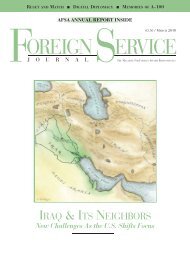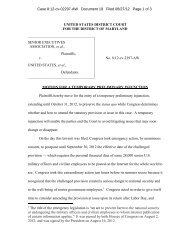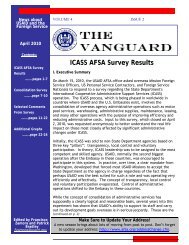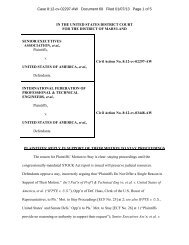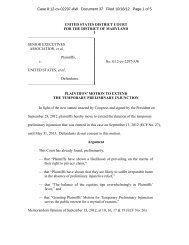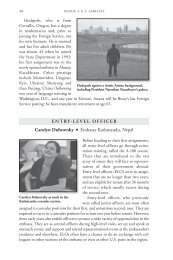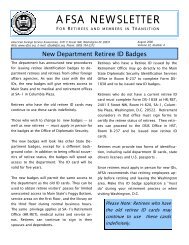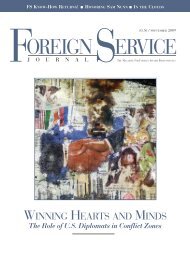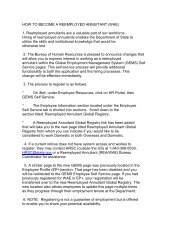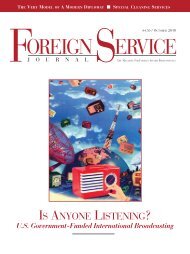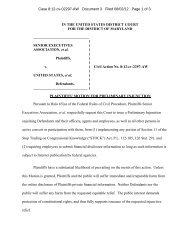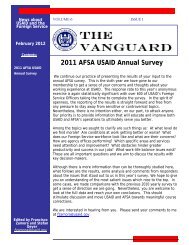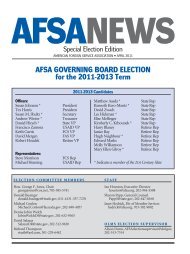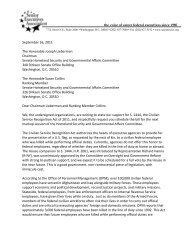F OCUS - American Foreign Service Association
F OCUS - American Foreign Service Association
F OCUS - American Foreign Service Association
You also want an ePaper? Increase the reach of your titles
YUMPU automatically turns print PDFs into web optimized ePapers that Google loves.
the power of time to whiten. Stewart Alsop<br />
made the interesting point Sunday [Jan.<br />
28, 1973] in the New York Times Book<br />
Review that <strong>American</strong> presidents since<br />
Roosevelt have disliked the State Department<br />
and leaned heavily on the military<br />
because the military tend to be brisk, cando<br />
problem-solvers while senior <strong>Foreign</strong><br />
<strong>Service</strong> officers tend to be “skeptical examiners<br />
of the difficulties”; and worried,<br />
uncertain presidents will prefer positive to<br />
negative advice. You will notice that this<br />
reliance on military advice coincides with<br />
the era of air power and has much to do, I<br />
think, with the enormous attraction of the<br />
easy solution — the idea that a horrid<br />
problem can be solved from the air, without<br />
contact, without getting mixed up in a<br />
long, dirty business on the ground. …<br />
The costliest myth of our time has been<br />
the myth of the communist monolith. We<br />
now discover happily, if belatedly, that the<br />
supposed Sino-Soviet unity is, in fact, a<br />
bitter antagonism of two rivals wrapped in<br />
hate, fear and mutual suspicion. Our original<br />
judgment never had much to do with<br />
facts, but was rather a reflection of fears<br />
and prejudices. Knee-jerk reactions of this<br />
kind are not the best guide to a useful foreign<br />
policy, which I would define as the<br />
conduct of relations and exercise of influence<br />
so as best to serve an enlightened<br />
self-interest.<br />
The question remains, what can be<br />
done to narrow the gap between information<br />
from the field and policymaking at<br />
home. First, it is essential to maintain the<br />
integrity of <strong>Foreign</strong> <strong>Service</strong> reporting, not<br />
only for the sake of what may get through,<br />
but to provide the basis for a change of<br />
policy when the demand becomes imperative.<br />
Second, some means must be found<br />
to require that preconceived notions and<br />
emotional fixations be periodically tested<br />
against the evidence. Perhaps legislation<br />
could be enacted to enforce a regular<br />
pause for rethinking, for questioning the<br />
wisdom of an accepted course of action,<br />
for cutting one’s losses if necessary. ■<br />
Eight separate panels<br />
would investigate and<br />
clear Davies of<br />
disloyalty before State<br />
finally dismissed him on<br />
Nov. 4, 1954.<br />
— and almost life itself — in the<br />
arduous service of his government.<br />
Eight times he was investigated …<br />
One by one the politically inspired<br />
charges of communism, disloyalty or<br />
perjury were dropped; the ninth board<br />
came up with something new, called<br />
defects of character. Mr. Davies is not,<br />
concluded the board and Mr. Dulles,<br />
of sufficient judgment, discretion and<br />
reliability. Sufficient, one may ask,<br />
unto what? Their test can only have<br />
been of supernatural design. I saw<br />
their victim measured against the<br />
most severe tests that mortal man can<br />
design. Those he passed. At the head<br />
of the class.”<br />
Unlike the many journalists and<br />
editorial writers who came to Davies’<br />
defense, his <strong>Foreign</strong> <strong>Service</strong> colleagues<br />
mostly preserved an embarrassed<br />
silence. The department’s legal<br />
adviser, who was assisting Davies and<br />
other China hands in preparing their<br />
defense, commented in disgust that<br />
State was a “gutless place.” To reinforce<br />
this quiescence, Dulles appointed<br />
Loy Henderson, a man who had<br />
“impeccable credentials with the<br />
McCarthyites,” as under secretary for<br />
administration, to exercise only nominal<br />
supervision over Security<br />
Director Scott McLeod (whose<br />
motto was “an ounce of security is<br />
worth a pound of brains”). The striking<br />
exception to this timidity was the<br />
FSO who was in the best position to<br />
attest not only to Davies’ character,<br />
but to his loyalty and professional<br />
integrity: George Kennan.<br />
Kennan and Davies had first met<br />
in the spring of 1937, when Davies<br />
visited the embassy in Moscow and<br />
was invited to lunch by Kennan and<br />
his wife Anneliese. Davies later said<br />
of the lunch, which took place as<br />
Stalin’s show trials were occurring,<br />
“This was the first lesson in Russian<br />
psychology and communist politics<br />
that I was to receive from an extraordinarily<br />
gifted colleague, teacher and<br />
friend.”<br />
Kennan, for his part, admired<br />
Davies’ “broad, sophisticated and<br />
skeptical political understanding,<br />
without an ounce of pro-communist<br />
sympathies.” He was delighted to<br />
have Davies join his staff in Moscow<br />
in January 1945, where he became, in<br />
Kennan’s words, “a rock of strength.”<br />
He would also be the first person<br />
Kennan asked to join the new Policy<br />
Planning Office in Washington when<br />
it was established with Kennan as<br />
director on April 29, 1947. The two<br />
men worked very closely together<br />
until Kennan’s resignation as director<br />
on Dec. 31, 1949. In the view of<br />
Wilson Miscamble, the leading historian<br />
of the Policy Planning Office<br />
staff, Davies was an “equal partner in<br />
helping frame Kennan’s policy advice<br />
on China, Japan and Southeast Asia.”<br />
In the chapter on McCarthyism in<br />
the second volume of his memoirs,<br />
Kennan relates six separate interventions<br />
on Davies’ behalf that he undertook,<br />
beginning in the summer of<br />
1951, when he paid his own way back<br />
from Europe to testify for Davies at<br />
two separate hearings. Despite being<br />
discouraged by the department from<br />
making his views public, he subsequently<br />
wrote letters to Time magazine<br />
and the New York Times, and<br />
gave a widely reported speech on the<br />
dangers of McCarthyism at Notre<br />
Dame University. As a result of these<br />
JULY-AUGUST 2008/FOREIGN SERVICE JOURNAL 51



